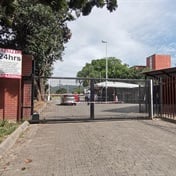Two kilometres down the road from Sasol’s big Secunda plant, the Kleinspruit river reaches the township of Embalenhle. While the town of Secunda has the benefit of being upstream from Sasol, Embalenhle’s 200 000 residents have this river flowing through their back yard.
Like cattle farmer Chris Skosana, many residents keep cattle and goats that drink from this river; others use it for fishing, and on Sundays church groups baptise members here.
Sasol says that when the December 2013 incident occurred they immediately informed the department of environmental affairs and asked a large team of technicians and engineers to fix the problem.
Sasol did not, however, warn the community, because “it was deemed not necessary, as the water quality was within legally acceptable levels”, said Sasol spokesperson Alex Anderson. He said the municipality released additional water from dams upstream to dilute any chemicals released into the river.
Nono Maseko heads up the African Community Dialogue in Embalenhle: “[Sasol] are trying to make people aware of the pollution but it is not that effective. They need to do more,” he said. “Individuals who read the newspaper may know, but other vulnerable people don’t know.”
At a community dialogue that City Press attended late last year, people stood up one after the other to express their fears about what the presence of the giant Sasol plant was doing to their health. They asked not to be named for fear of antagonising the biggest industry, and employer, in town.
“What hurts me most is that we black people were brought here, where this place is polluted. The rich white people are placed on the other side, where the pollution does not reach them. You can tell how serious this pollution is by the number of doctors in Emba – they know there is a lot of money to be made,” said a young man and local activist.
“We never used to have these chest pains and [related health] issues. We have problems with our eyes and we don’t know why. Even the children are suffering,” said an elderly woman.
Other women at the meeting agreed.
“I have a 15-year-old child at home. She suffers from sinusitis. When she was growing up, this was never an issue,” said another woman. “We buy medicines, but it makes no difference. What should we do? Our children are suffering. We are not too concerned about us older people – we can die at any time; the children are our main concern.”
A man added: “When the time comes for young people to start working, Sasol will tell them they are not well and cannot work. But who made them sick in the first place? People now grow sick. A child grows to adulthood as a sick person.”
Sasol says it has spent R20 billion over the past 10 years improving environmental conditions, such as air quality, around their plants. They also say reports have found that they do not exceed national air quality standards.
But with little information and growing fears, many people link their illness to Sasol.
“When the community, who are the stakeholders, engage Sasol they are met with suspicions, as if they have malicious intentions, as if they just want to get money from them,” one of the men explained.
“But that’s not the case. People are getting very sick. They are not employable anywhere, not just at Sasol, because they are sick. They are forced to live on medication. Many use sleeping tablets and asthma pumps – their quality of life is degenerating.”
On the north side of Embalenhle, a massive construction project has been under way since 2014 to reline one of Sasol’s pollution-control dams.
The Halvepan Dam’s hazard potential is listed on the government register as “significant”, but despite the closest houses being barely 100m away, no one we spoke to had been informed about whether it posed a risk.
Sasol said the dam was used to store “saline effluent containing calcium, magnesium, sodium, sulphates and chlorine”, and that, as part of a proactive move, they had informed the department that the dam was “potentially contaminated land” and agreed to line it.




 Publications
Publications
 Partners
Partners








